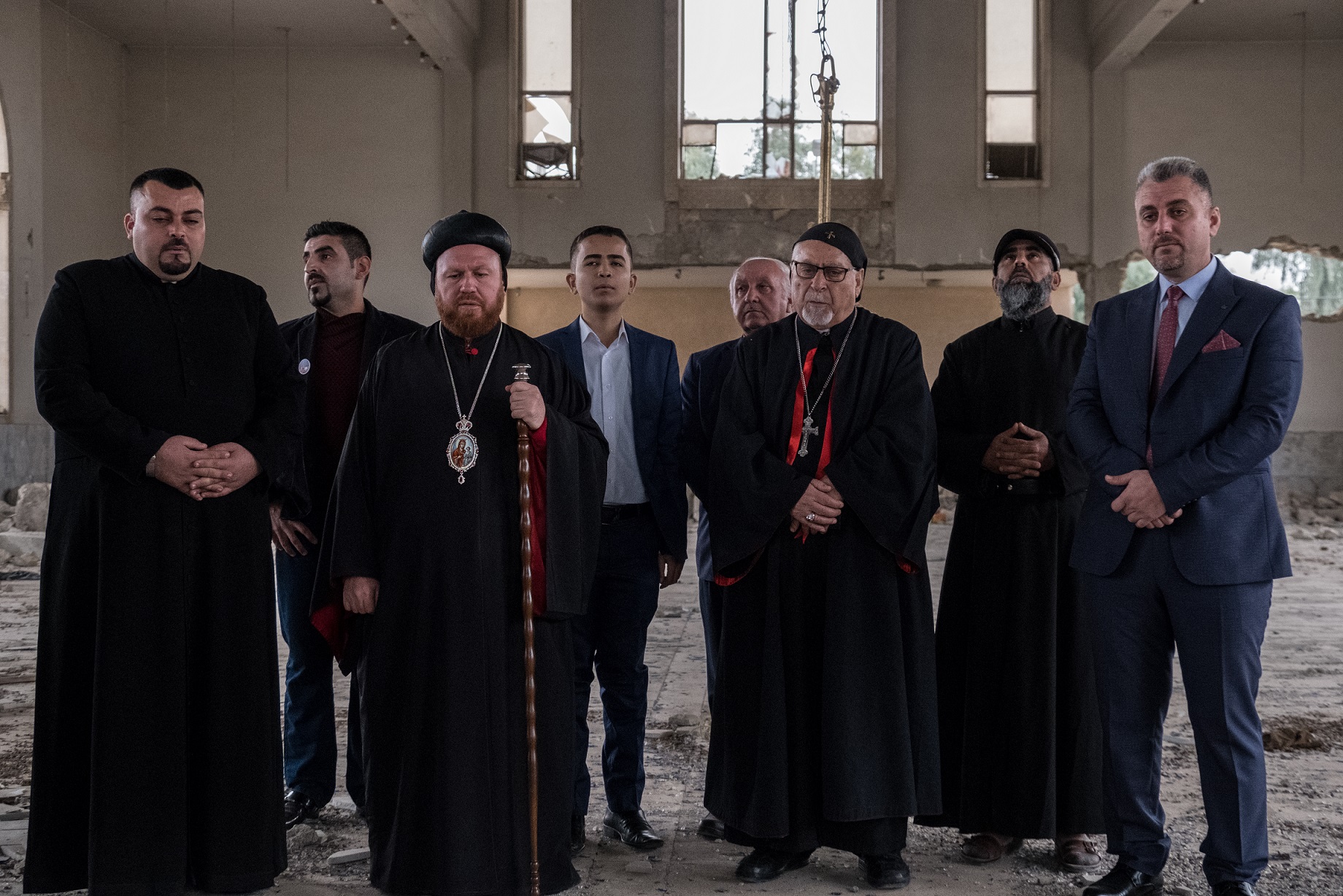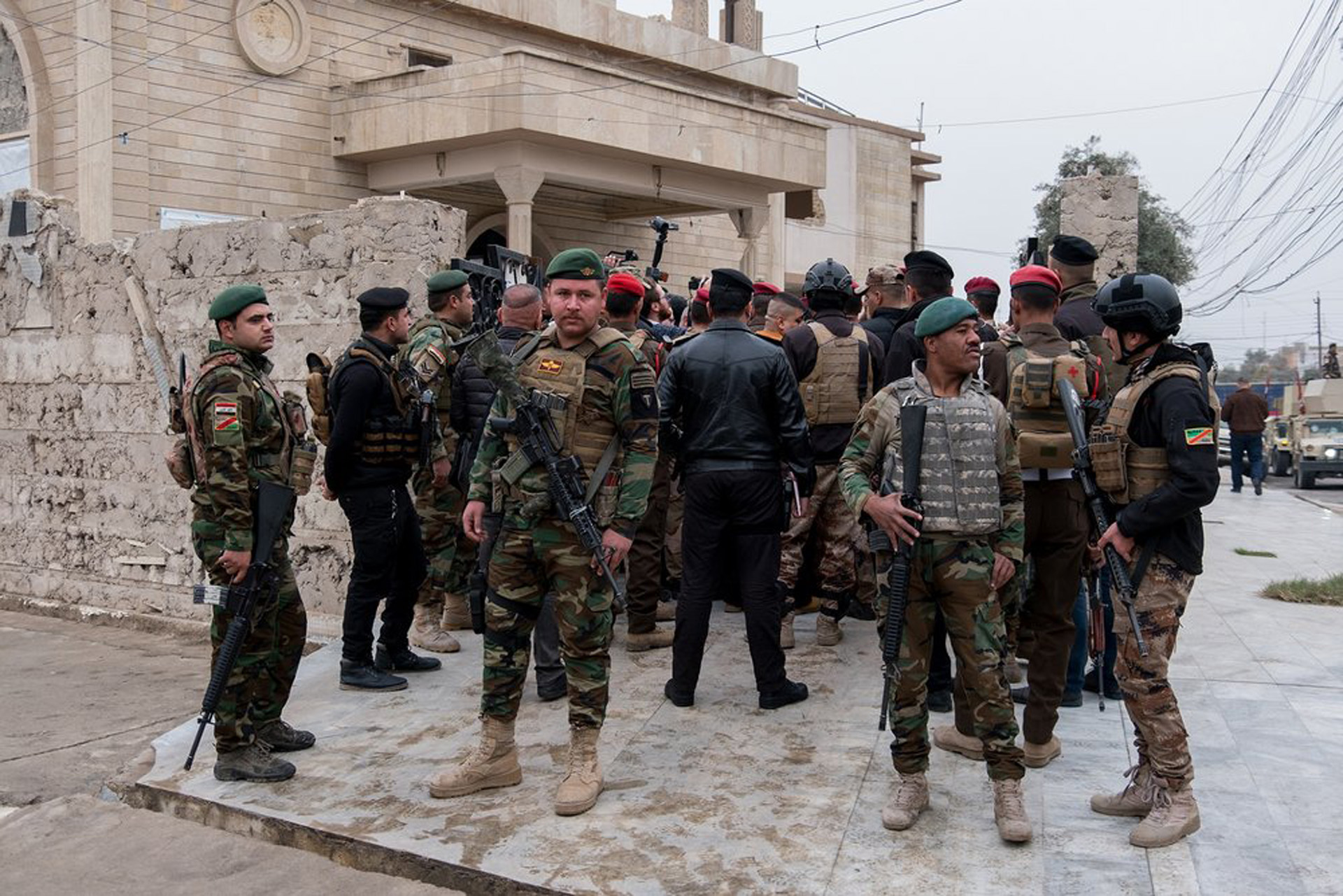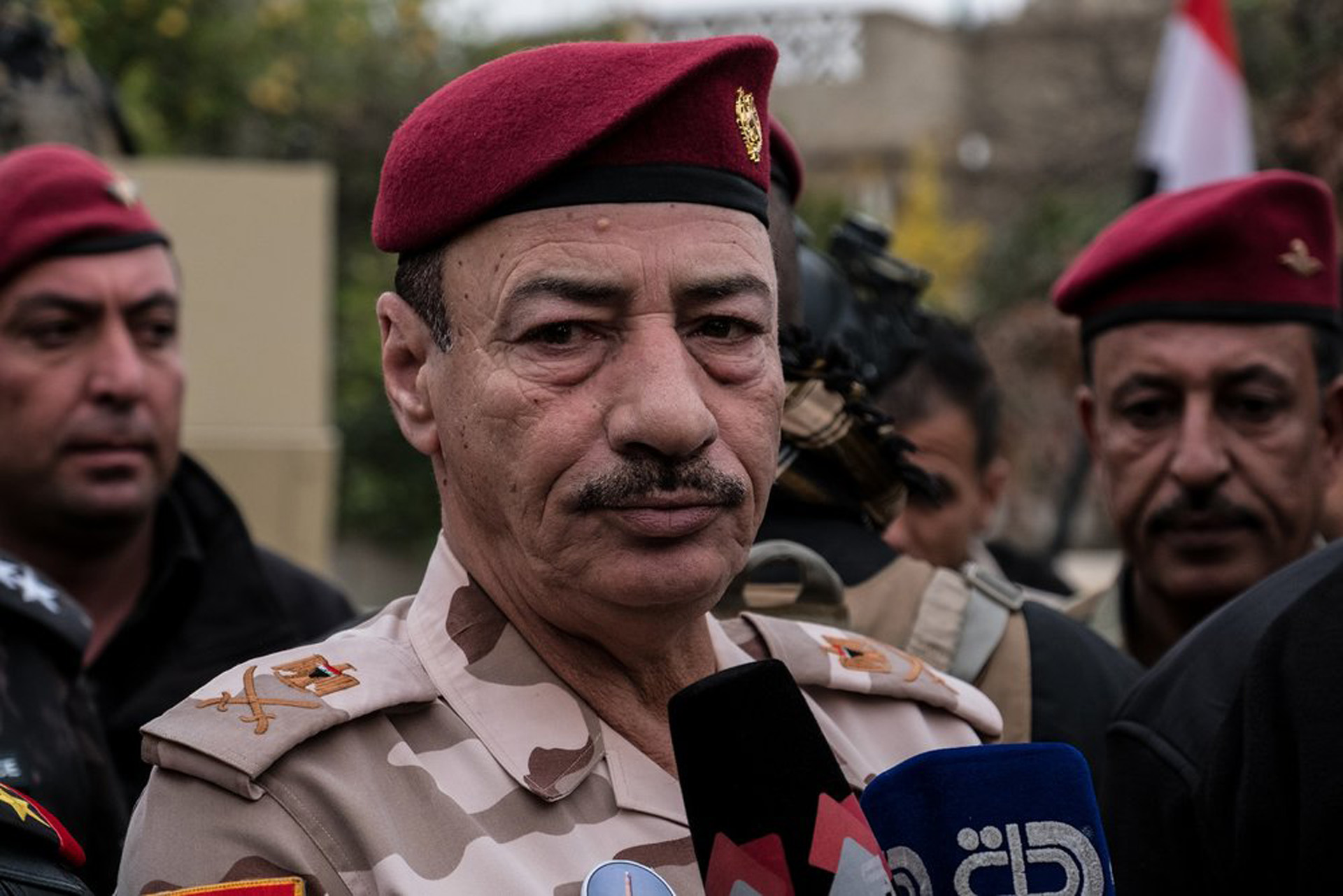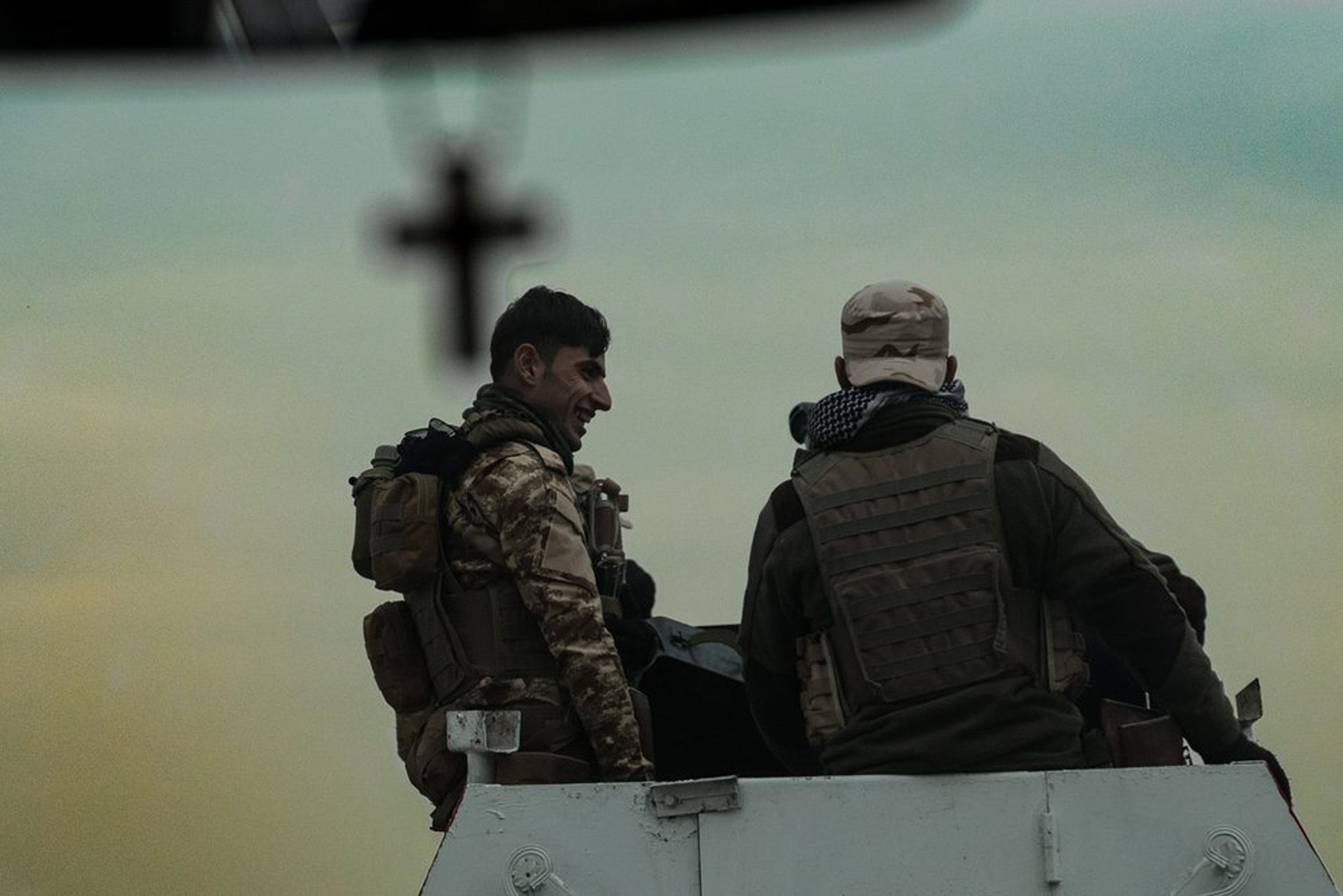
by Constantin Gouvy
The first Christmas mass held in Mosul since coalition forces retook the city from ISIS in July took place amid tight security on December 24th, 2017, with the help of the city’s Muslim community. A powerful message of religious coexistence sent from the heart of ISIS’s former “capital” in Iraq, the mass was a first step in overcoming the many challenges that remain to the return of Christians to the city. Pictured above: A moment of spiritual communion between the prelates of the Syriac-Orthodox and Syriac-Catholic churches, inside the ruins of the Syriac-Orthodox St. Ephrem’s Cathedral, used by ISIS as one of its bases during its rule over the city. Photo by Constantin Gouvy.
The Christian congregation gathered at St. Paul’s church in East Mosul on the morning of December 24th punctuated its first Christmas service since coalition forces retook the city from the Islamic State (ISIS) in July with ululations and rounds of applause. The event reflected the growing optimism of a city and of its communities. Their healing process, however, has only just begun and many obstacles remain to the return of Christians, easily outnumbered by local journalists and security forces at the mass. The fact that Christmas songs resonated in Mosul for the first time since 2013 was largely thanks to the initiative of a group of young local Muslim and Christian students, whose message of unity reverberated throughout the event.
“I call onto all communities of Iraq to come together and rebuild our country hand in hand,” said Louis Raphael Sako, head of the Chaldean Catholic Church, in his opening remarks. “ISIS tried to undermine the relationship between Muslims and Christians, but with this mass, we show them we are healing,” he added, looking at two Muslim Sheikhs in the first rows who had come to show their support. As the mass drew to a close, a Muslim neighbor warmly embraced a Christian returnee, as if to seal the call for unity.
In harrowing contrast to the message of hope conveyed by the event, however, the gaunt ruins of the church were a bleak reminder that during their brutal rule, ISIS militants had painstakingly desacralized St. Paul’s, like many other places of worship, and systematically persecuted religious minorities. Once majestic, the church was now stark and bereft of ornaments and colors; its stained-glass windows had been smashed, and the marble looted from the grey concrete walls, which now lay bare.

Pictured above: The whole menagerie of Iraq’s security services were called in to ensure the safety of the Christmass mass at St Paul’s Church in East Mosul on Dec 24th. Photo by Consantin Gouvy.
“A revenge against ISIS”
But for the time of the Christmas service, it was as though the concord that seemed to have just formed between the Muslim and Christian communities, and between the Christian Churches of Iraq themselves, had conferred a new aura of sanctity upon a building now hardly recognizable as a church. The words of the prelates resonated with rare intensity amongst a congregation, which, until recently, dared not dream to exercise freely its religion in its hometown.
Many in the audience, including some in the security services, had traveled for the occasion from the neighboring region of Iraqi Kurdistan, where they found refuge in 2014 as ISIS overtook the city. “I was born in Mosul and I am glad to be back home for Christmas,” said Waseem Imad, as he stood surrounded by his Christian and Muslim friends. A 30-year-old Christian officer with the “men in black” of the National Security Service (NSS), Imad was one of the plainclothes agents at the event. He had swapped his black uniform for a bright orange jumper for the occasion. “Attending this Christmas mass in Mosul is a revenge against ISIS,” he confided.
But out of all the security forces present, the ones for which the mass bore the most significance was the Nineveh Plains Protection Units (NPU), a Christian defense militia. In the run-up to the battle of Mosul in October 2016, the group rose up against ISIS and retook the nearby Christian city of Qaraqosh and several villages in the Nineveh plains.
The message at the mass, however, was that the time for confrontation was over. “I am very glad to see our Christian brothers returning home, and I want to send them a message: we need them to rebuild Mosul,” indicated Najim al-Jibouri, commander of the Iraqi army in Mosul and a key figure in the battle for the city. “I also want to send a message to the terrorists,” he continued, “they tried to tear us apart, but they failed, and we are now united.”
Syriac-Catholic Archbishop of Mosul Petros Mouche, one of the prelates on stage at the event, shared in an aside with a light but cheerful smile, “the mass has filled me with joy and hope for the future, and the return of Christians to Mosul.” He trusts such initiatives will help restore Christians’ confidence in their Muslim neighbors. “Nobody can force Christians to come back to Mosul, but we can try and convince them,” he said.
Some have answered his call. Hossam Jalil Abud, a defiant 56-year-old retired Iraqi military personnel who uses a wheelchair, claims to have been the first Christian to settle back in the city, just over ten days before the mass. He has received several death threats from ISIS since, but he is glad to be back in Mosul, “a land of God for people of all faiths,” he said.

Pictured above: Najim al-Jibouri, commander of the Iraqi army in Mosul and a key figure in the battle for the city, telling his “Christian Brothers” in front of St. Paul’s church that the Muslim community needs them to rebuild Mosul. Photo by Constantin Gouvy.
“I still fear for my life here, in Mosul”
Others, like Habiba H.[1], a Christian woman who fled to neighboring Iraqi Kurdistan when ISIS entered the city, are still reluctant to settle back in Mosul. “I’m not afraid of real Muslims, I’m afraid of people who pretend to be Muslims but think like ISIS,” she said. “I want to return home, but I still fear for my life here in Mosul,” she continued. Time, and further re-assurances that Christians will be safe is needed to convince her and her community to re-establish themselves in a city that bears traumatic memories for all of them, even prior to ISIS’ stronghold on the city.
Back in the 1980s, the Christian community was an integral part of Mosul’s social fabric. But the number of Christians has since dramatically shrunk, especially after the 2003 US invasion, and comparatively few remained in June 2014 when ISIS entered the city. In the late 2000s, Mosul was already a difficult place to live for Christians, and tensions ran high in the city. In 2008, for instance, Catholic bishop Faraj Rahou and several deacons were murdered.
Today, only 60 Christian families have come back to Mosul, and it is yet unclear how many more will return. The city stands in sharp contrast to the nearby Christian town of Qaraqosh, retaken from ISIS just over a year ago, where a significant number of Christians have returned. Large crowds gathered in the churches’ courtyards on Christmas Eve for celebratory Christmas bonfires, as their children dressed in Santa costumes, some mesmerized by the ceremony, some chasing after each other and playing games, breathed life into the celebrations.
The setting was altogether different at St. Paul’s in Mosul earlier in the day. Outside the church stood the whole menagerie of Iraq’s security services. Catholic and Muslim units alike had been called in to ensure the safety of the event, setting up checkpoints to cut the area off from regular traffic, and jamming up adjacent streets with armored vehicles. The imposing security measures deployed for the occasion matched the severity of the threat and served as a bitter reminder that Christian gatherings remain a target of choice in ISIS’s former “capital” in Iraq.

Picture above: The NPU convoy of armored vehicles, mounted with heavy machine guns and painted with the Iraqi flag and the punisher logo, escorted the representatives of the Syriac-Catholic and Syriac-Orthodox churches to the al-Bishara church and St. Ephrem’s Cathedral. Photo by Constantin Gouvy.
Towards a newfound solidarity?
Yet, in spite of the complexities of restoring religious minorities’ trust in Mosul and its majority inhabitants, one can find reasons to be hopeful in that both the city’s leaders and its youth are taking initiative to mend long-standing divides and bring peace to this fractured city. Signs of a new entente cordiale between the Christian and Muslim communities, and between the Catholic and Orthodox Churches of Iraq, manifested throughout the day.
“It is my first time in a church,” said Taha al-Saffar, a 21-year-old student and one of the two-dozen Muslim volunteers who cleaned up St. Paul’s and joined forces with Christians at the University of Mosul to organize the mass. An informal, grassroots initiative launched just over two weeks ago and led by Mohamed al-Zakaria, the project “Mosul for all its peoples” has shown Christians that the Muslim community is ready to help them take their first steps on the long and arduous path of taking back ownership of their places of worship in Mosul. “I skipped classes at University to be here today,” Taha revealed with a mixed sense of pride and guilt. “It was important for me to be here, to tell the Christian community that their Muslim neighbors want them back, that Mosul is their city too, a city to be shared, a city for all to coexist peacefully.”
Christmas celebrations also seemed to initiate a dialogue within the Christian community itself. A moment of rare intensity and intimacy between the Syriac-Catholic and Syriac-Orthodox Churches in Iraq followed the mass, one that may foretell a rapprochement between the two Christian Churches, which have grown apart. Far from the prying eyes of the journalists gathered at St Paul’s, a convoy of armored NPU vehicles mounted with heavy machine guns left the church at the close of the event and sped down the streets of East Mosul, sirens blazing. The convoy escorted two possible targets, the representatives of the Catholic and Orthodox Churches, to the al-Bishara’s church and Saint Ephrem’s cathedral, which have yet to be cleaned, restored, and put back to use.
Saint Ephrem’s is enclosed within a heavily guarded NSS base. Soldiers’ insistent admonition “no photos!” as they rushed the prelates through the rubble of the Syriac-Orthodox cathedral, was an intimation that the place of worship is otherwise off limits, and this visit, an exception to the rule. What was left of the walls, riddled with bullet impacts and shell holes, still bore the stigma of war. A painful reminder for the religious delegation that the terrorist group had repurposed the church as one of its bases during its rule over the city, a painting of ISIS’s flag had only just begun to fade.
In a fleeting but compelling moment of spiritual communion between the prelates of the two Churches, Archbishops Petros Mouche and Nicodemus Sharaf sang and prayed in unison in the desolate landscape of the cathedral, as the call for prayer of one of the nearby mosques played in the background. An unlikely tripartite congregation had just formed under the benevolent eye of a religious figure painted on the Cathedral’s high ceiling.
Constantin Gouvy is a Research Assistant and independent journalist with a number of years of experience in conflict research and a focus on the MENA region. He has worked in London, Geneva, and Brussels with think tanks and INGOs, and in conflict-afflicted environments in the West Bank, Nagorno-Karabakh, refugee camps, Kenya, and currently in Iraq. He has worked on Iraq specifically since the day IS took Mosul in June 2014, including with international think tanks such as Human Rights Watch and Crisis Group, and has lived in Erbil since September 2017. You can follow him on Twitter at @ConstantinGouvy.
[1] Name withheld for safety concerns.


